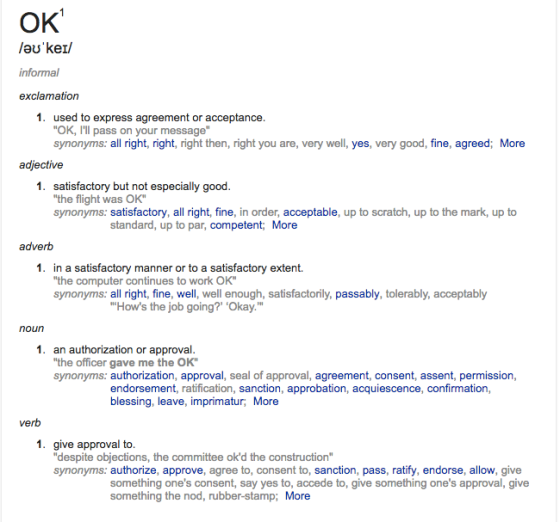What is OK?

Above is what Google reckons OK means. But I think everyone has their own definition. For me, OK is being able to live my life without having to rely on extra medications and being able to do the stuff I want to do every day. Like going into class, not being afraid to go out, not having panic attacks at the idea of doing simple things. That, for me, would be epic.
At the minute I can’t say I’m OK. I’m needing a lot of medication on top of my regular stuff to get through the day. Strong doses of antidepressants and antipsychotics. It’s hard.
But there are other kinds of “not OK.” There’s physically not OK. I spent so long dealing with physical not OK that when emotional not OK happened, I didn’t know how to deal with it. It took those around me to recognize it and tell me I wasn’t OK. I wanted to deal with it in my own way and that was to ignore the blatantly obvious. I spent so much time worrying about other people that I missed things getting worse with me. And I’ve learned from it.
I’ve learned it’s OK to not be OK. It took a long time for me to be able to say that. I wanted for so long to be able to deal with everything and not need to ask for help. But it didn’t make any difference because everyone around me knew there was something not right.
I learned by admitting I wasn’t OK, I could get help faster, which would mean getting better quicker. And by saying “I’m not OK,” I’ve grown to the point that when I say I am OK, people actually believe it.
I’m still not OK in the grand sense of the term. I might have OK days, where things go right and I feel better, but overall I know I’m not OK. But that’s OK. Because I’ve got people looking out for me to make me be OK.
It’s taking time. And I hate that. I’m not a patient person, and I don’t want to wait around for something to happen. Hopefully a combination of the right medications and therapy will get me to a point where I can say I’m OK more than saying I’m not OK.
Just remember, it’s OK to not be OK.
Image via Thinkstock.

